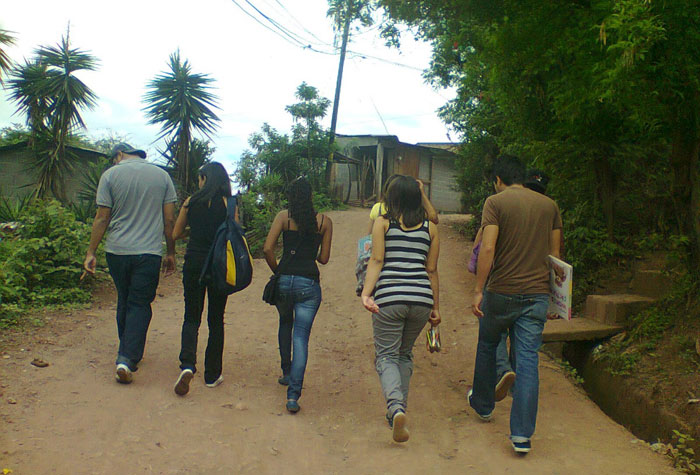Supporting the Right to Education and Culture

In 2017, ATD Fourth World invited people around the world to document real-life “Stories of Change”. These stories are about situations of injustice and exclusion caused by extreme poverty. Written by activists, community leaders, and others, they show that when people work together, real change can happen.
More about “Stories of Change”.
A group of committed and dynamic young people reaches out to others in order to break the chains of poverty through access to education and culture.
By Maria Luisa Velasquez (Honduras)
Today, young people in Nueva Suyapa (Tegucigalpa, Honduras) have their own way of struggling against poverty.
We have experienced poverty ourselves, but we also have access to books and to knowledge. We are part of this community. We work or study here, but we also volunteer our time to go out and meet other families who, like us, want to break the chains of poverty through access to education and culture.
We are very committed to this work, work that we first got involved with just a few years ago.
Everything started in 1990. A group of religious people took the initiative to set up the first Street Libraries in Nueva Suyapa, a disadvantaged neighborhood in the capital city of Honduras.
Young people and adults began working together to run the Street Library. A year later, members of ATD’s Volunteer Corps joined us. They encouraged other young people to help with efforts on behalf of the poorest people, especially in Comayaguela—the Flores de Oriente, los Pinos, and la Bolsa regions.
Our involvement in this work is a form of resistance in this place that has been hit so hard by violence—violence that mostly affects young people. It is our way of showing other people that we too can serve the community. We are demonstrating that we can build a culture in which people work together to create a space where they can breathe in peace, even in an area where others are usually afraid to go.
We may all come from different backgrounds, but we have something in common—energy, happiness, and enthusiasm. It’s contagious! We are all committed to finding children and families who live in conditions that are even harder than our own, and then including them in our projects.
On Sundays, people welcome us with big smiles and enthusiasm. There is a natural give and take in the trust people show us and in our readiness to listen. I can honestly say that we have become their “relatives” just as they are also welcomed into our families.
As Dona Doris, who lives in one of the neighborhoods where we work, said, “ATD Fourth World is my family.” Her struggles have set an example for us. We have made friends and gained the motivation to continue what we’re doing even when we don’t have a lot of volunteers supporting us.
In time, many children were taking part in our activities. When these children became older, they started to help organize and lead the Street Library themselves.
Working alongside us allowed these young people to express their desire to make a difference by sharing education and arts with younger children in the area. It was important to these young people to be recognized as having something valuable to contribute.
Alex, for instance, started volunteering with the Street Library when he was 14 years old and went on to become responsible for the entire ATD Fourth World coordination team in Honduras.
Describing how he first felt about the Street Library workers, Alex said, “It was incredible they came here even though it’s a place other people don’t usually go, a place with a reputation for violence and poverty. I never missed a single Street Library.”
We are still seeing this trickle-down effect today. Some of the children from our first Street Libraries have become parents themselves. Wendy and her husband, for instance, encourage their own children to get involved in the Street Library.
Many others support us as well, doing what they can to contribute through their family, their work, or their studies. The most important thing is that they have an opportunity to devote their time, their creativity, and their talents—but most of all their deeply felt concern for others—to our ongoing efforts to reach out and get to know new people.
We try to leave with each child the idea that together we can change the world. It is their families who inspire us, their families who look forward to our visits because they are full of hope for a better world. They are counting on us to listen to them and to let other people know how hard they struggle every day to improve their lives.
Everyone needs someone to listen to them and a shoulder to cry on. Everyone needs to know that they too are important.

